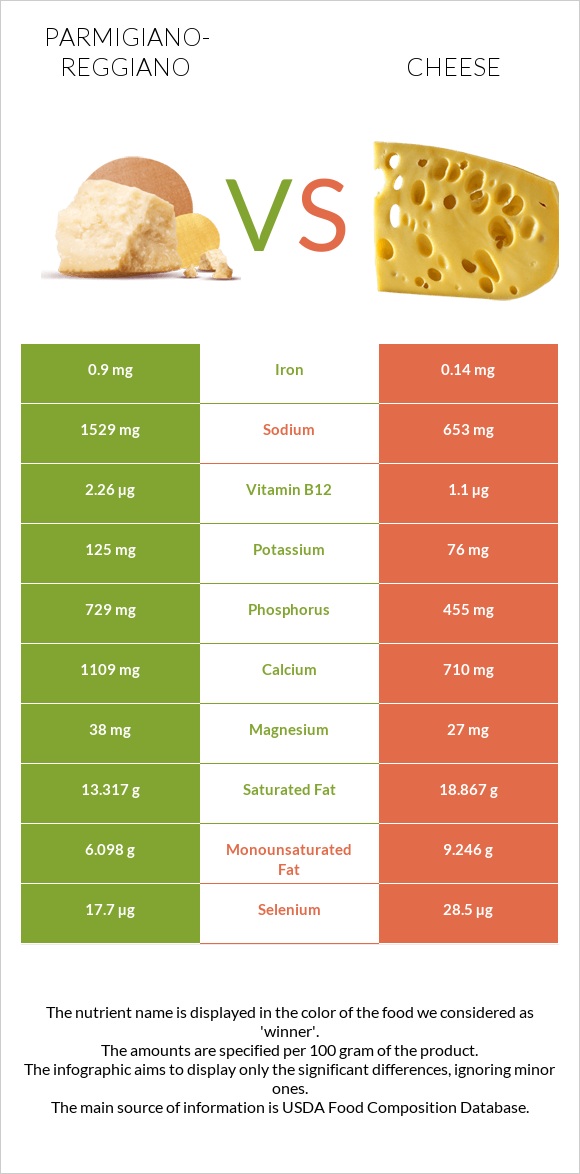Parmigiano-Reggiano vs. Cheese — In-Depth Nutrition Comparison
Compare
Summary of differences between parmigiano-Reggiano and cheese
- Parmigiano-Reggiano has more vitamin B12, calcium, phosphorus, copper, and iron; however, cheese is higher in selenium and vitamin A.
- Parmigiano-Reggiano covers your daily need for vitamin B12, 48% more than cheese.
- Parmigiano-Reggiano has 8 times more copper than cheese. While parmigiano-Reggiano has 0.238mg of copper, cheese has only 0.03mg.
- Cheese has less sodium.
- The glycemic index of parmigiano-Reggiano is higher.
These are the specific foods used in this comparison Cheese, parmesan, dry grated, reduced fat and Cheese, cheddar.
Infographic

Infographic link
Mineral Comparison
Mineral comparison score is based on the number of minerals by which one or the other food is richer. The "coverage" charts below show how much of the daily needs can be covered by 300 grams of the food.
| Contains more MagnesiumMagnesium | +40.7% |
| Contains more CalciumCalcium | +56.2% |
| Contains more PotassiumPotassium | +64.5% |
| Contains more IronIron | +542.9% |
| Contains more CopperCopper | +693.3% |
| Contains more PhosphorusPhosphorus | +60.2% |
| Contains more ManganeseManganese | +214.8% |
| Contains less SodiumSodium | -57.3% |
| Contains more SeleniumSelenium | +61% |
Vitamin Comparison
Vitamin comparison score is based on the number of vitamins by which one or the other food is richer. The "coverage" charts below show how much of the daily needs can be covered by 300 grams of the food.
| Contains more Vitamin B2Vitamin B2 | +13.6% |
| Contains more Vitamin B3Vitamin B3 | +93.2% |
| Contains more Vitamin B12Vitamin B12 | +105.5% |
| Contains more Vitamin AVitamin A | +106.3% |
| Contains more Vitamin EVitamin E | +317.6% |
| Contains more Vitamin DVitamin D | +50% |
| Contains more Vitamin B5Vitamin B5 | +26.2% |
| Contains more Vitamin B6Vitamin B6 | +34.7% |
| Contains more Vitamin KVitamin K | +41.2% |
| Contains more FolateFolate | +170% |
All nutrients comparison - raw data values
| Nutrient |  |
 |
DV% diff. |
| Vitamin B12 | 2.26µg | 1.1µg | 48% |
| Calcium | 1109mg | 710mg | 40% |
| Phosphorus | 729mg | 455mg | 39% |
| Sodium | 1529mg | 653mg | 38% |
| Saturated fat | 13.317g | 18.867g | 25% |
| Copper | 0.238mg | 0.03mg | 23% |
| Fats | 20g | 33.31g | 20% |
| Selenium | 17.7µg | 28.5µg | 20% |
| Vitamin A | 160µg | 330µg | 19% |
| Iron | 0.9mg | 0.14mg | 10% |
| Monounsaturated fat | 6.098g | 9.246g | 8% |
| Calories | 265kcal | 404kcal | 7% |
| Protein | 20g | 22.87g | 6% |
| Polyunsaturated fat | 0.462g | 1.421g | 6% |
| Cholesterol | 88mg | 99mg | 4% |
| Vitamin E | 0.17mg | 0.71mg | 4% |
| Vitamin B2 | 0.486mg | 0.428mg | 4% |
| Folate | 10µg | 27µg | 4% |
| Magnesium | 38mg | 27mg | 3% |
| Manganese | 0.085mg | 0.027mg | 3% |
| Zinc | 3.87mg | 3.64mg | 2% |
| Vitamin B5 | 0.325mg | 0.41mg | 2% |
| Carbs | 1.37g | 3.09g | 1% |
| Vitamin D | 15 IU | 24 IU | 1% |
| Potassium | 125mg | 76mg | 1% |
| Vitamin D | 0.4µg | 0.6µg | 1% |
| Vitamin B6 | 0.049mg | 0.066mg | 1% |
| Vitamin K | 1.7µg | 2.4µg | 1% |
| Choline | 20.7mg | 16.5mg | 1% |
| Net carbs | 1.37g | 3.09g | N/A |
| Sugar | 0g | 0.48g | N/A |
| Vitamin B1 | 0.029mg | 0.029mg | 0% |
| Vitamin B3 | 0.114mg | 0.059mg | 0% |
| Trans fat | 0.917g | N/A | |
| Tryptophan | 0.24mg | 0.547mg | 0% |
| Threonine | 1.519mg | 1.044mg | 0% |
| Isoleucine | 1.2mg | 1.206mg | 0% |
| Leucine | 2.983mg | 1.939mg | 0% |
| Lysine | 2.459mg | 1.025mg | 0% |
| Methionine | 0.369mg | 0.547mg | 0% |
| Phenylalanine | 1.604mg | 1.074mg | 0% |
| Valine | 1.498mg | 1.404mg | 0% |
| Histidine | 0.752mg | 0.547mg | 0% |
| Omega-3 - EPA | 0g | 0.01g | N/A |
| Omega-3 - DHA | 0g | 0.001g | N/A |
| Omega-3 - DPA | 0g | 0.017g | N/A |
| Omega-6 - Eicosadienoic acid | 0.007g | N/A |
Macronutrient Comparison
Macronutrient breakdown side-by-side comparison
Protein:
20 g
Fats:
20 g
Carbs:
1.37 g
Water:
50.6 g
Other:
8.03 g
Protein:
22.87 g
Fats:
33.31 g
Carbs:
3.09 g
Water:
37.02 g
Other:
3.71 g
| Contains more WaterWater | +36.7% |
| Contains more OtherOther | +116.4% |
| Contains more ProteinProtein | +14.4% |
| Contains more FatsFats | +66.6% |
| Contains more CarbsCarbs | +125.5% |
Fat Type Comparison
Fat type breakdown side-by-side comparison
Saturated fat:
Sat. Fat
13.317 g
Monounsaturated fat:
Mono. Fat
6.098 g
Polyunsaturated fat:
Poly. Fat
0.462 g
Saturated fat:
Sat. Fat
18.867 g
Monounsaturated fat:
Mono. Fat
9.246 g
Polyunsaturated fat:
Poly. Fat
1.421 g
| Contains less Sat. FatSaturated fat | -29.4% |
| Contains more Mono. FatMonounsaturated fat | +51.6% |
| Contains more Poly. FatPolyunsaturated fat | +207.6% |





